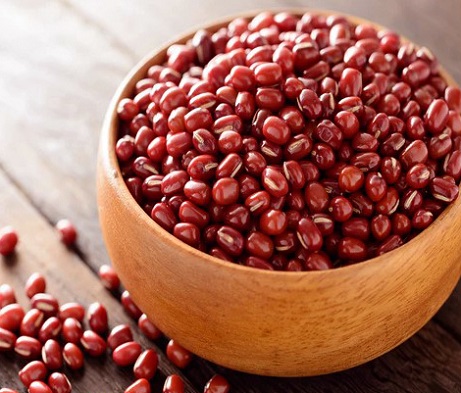Nikhil Prasad Fact checked by:Thailand Medical News Team Nov 12, 2024 5 months, 6 days, 14 hours, 31 minutes ago
Weight Loss News:
Introduction to Adzuki Beans and Obesity
Obesity is more than just extra weight; it's a chronic health condition that affects millions of people worldwide, potentially leading to diabetes, heart disease, and other serious health problems. To combat obesity, scientists are constantly searching for safe and effective treatments. Recently, researchers from institutions such as Guangdong Provincial Key Laboratory IRADS and the National Clinical Research Center for Respiratory Disease in China explored the anti-obesity effects of adzuki beans, a small red bean commonly used in Asian cuisine. This
Weight Loss News report dives into their findings, revealing that adzuki bean saponins (ABS) may help improve lipid (fat) metabolism, reduce oxidative stress, and alleviate obesity-related cellular issues.
 Adzuki Bean Extract May Offer New Hope for Obesity Management
Understanding Saponins: The Active Compounds in Adzuki Beans
Adzuki Bean Extract May Offer New Hope for Obesity Management
Understanding Saponins: The Active Compounds in Adzuki Beans
Saponins are naturally occurring compounds in many plants, known for their health benefits, including anti-inflammatory, anti-cancer, and now, anti-obesity properties. The research team extracted saponins from adzuki beans and identified 15 specific types using advanced techniques like UHPLC-QE-MS (Ultra-High Performance Liquid Chromatography-Quadrupole Orbitrap Mass Spectrometry). Their focus was on exploring these compounds’ effects on lipid accumulation in cells, as excessive fat storage is one of obesity’s hallmarks.
How Adzuki Bean Saponins Work: The PI3K/Akt Pathway
To better understand the potential anti-obesity mechanisms, the research team used network pharmacology and bioinformatics analyses to uncover the pathways through which adzuki bean saponins work. They found that ABS seems to act on a key signaling pathway in the body known as the PI3K/Akt pathway. This pathway plays a vital role in cell growth, survival, and metabolism. By influencing this pathway, ABS helps improve lipid metabolism, reduce fat buildup in cells, and possibly protect against the damage caused by oxidative stress.
Detailed Insights into the Study Findings
In laboratory experiments, the researchers used two different types of cells: HepG2 (a liver cell model) and 3T3-L1 (an adipocyte or fat cell model). These cells were exposed to conditions that mimic the high-fat environment associated with obesity. Researchers then treated them with various doses of ABS and examined the results. Here are the key findings:
-Reduced Lipid Accumulation: ABS treatment led to a noticeable reduction in fat buildup within the cells. The accumulation of fat, especially in the liver and fat tissues, is closely linked to obesity and related metabolic issues.
-Protection Against Oxidative Stress: This study showed that ABS has antioxidant effects. It decreased the production of reactive oxygen species (ROS), which are harmful byproducts that can damage cells. Reducing ROS levels is
crucial in managing obesity-related cellular stress.
-Improved Mitochondrial Health: ABS appeared to enhance mitochondrial function in cells. Mitochondria, often called the “powerhouses” of the cells, are responsible for energy production. Dysfunctional mitochondria are commonly seen in obesity and can worsen cellular stress and fat accumulation.
-Restored Membrane Potential: Healthy mitochondria maintain a specific membrane potential essential for energy production. ABS treatment helped restore this potential, suggesting that ABS could help maintain healthy energy balance in cells affected by obesity.
-Regulation of Key Proteins and Pathways: The study revealed that ABS influences several proteins involved in fat metabolism, such as PI3K, Akt, GSK-3β, and β-catenin. By regulating these proteins, ABS promotes healthier fat metabolism and cellular function.
Broader Implications of ABS for Obesity Management
Beyond the lab, the findings suggest that adzuki bean saponins may offer a natural option for managing obesity. ABS works by targeting cellular pathways that help regulate fat metabolism and reduce oxidative stress, two critical areas in obesity management. This research paves the way for future studies and potential clinical trials that could bring ABS-based supplements or treatments to the market.
Conclusion: A Promising Future for Natural Anti-Obesity Treatments
The potential of adzuki bean saponins as an anti-obesity treatment is exciting and offers hope for a more natural approach to tackling obesity. The research shows that ABS can improve fat metabolism, reduce oxidative stress, and support mitochondrial health, addressing some of the core issues associated with obesity. However, more research is needed, especially clinical studies involving human participants, to confirm these benefits.
The study findings were published in the peer-reviewed journal: Antioxidants.
https://www.mdpi.com/2076-3921/13/11/1380
For the latest
Weight Loss News, keep on logging to Thailand Medical News.
Read Also:
https://www.thailandmedical.news/news/probiotic-lactobacillus-rhamnosus-for-weight-control
https://www.thailandmedical.news/news/west-african-plant-secamone-afzelii-emerges-as-a-promising-natural-solution-for-obesity
https://www.thailandmedical.news/articles/weight-loss-news
